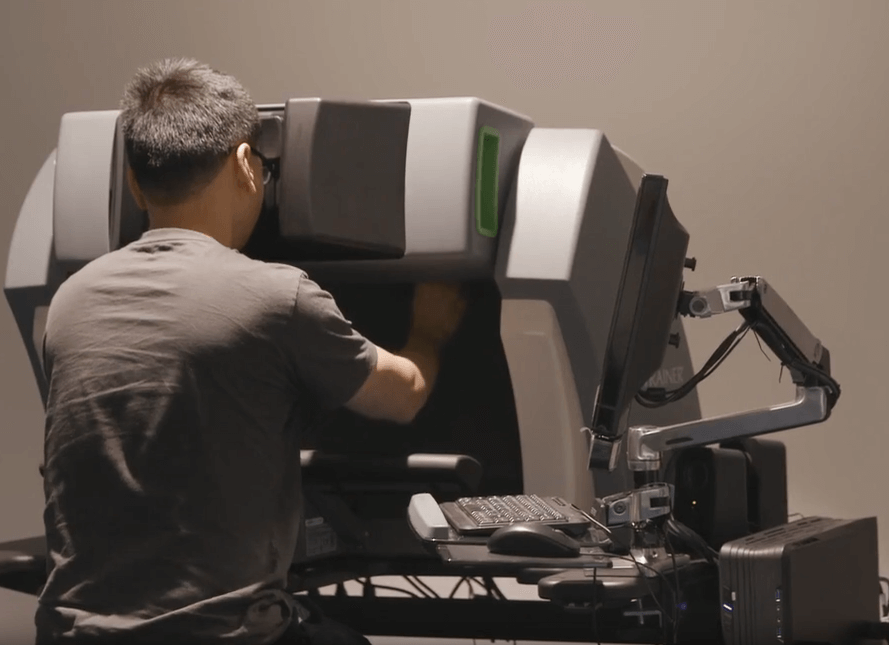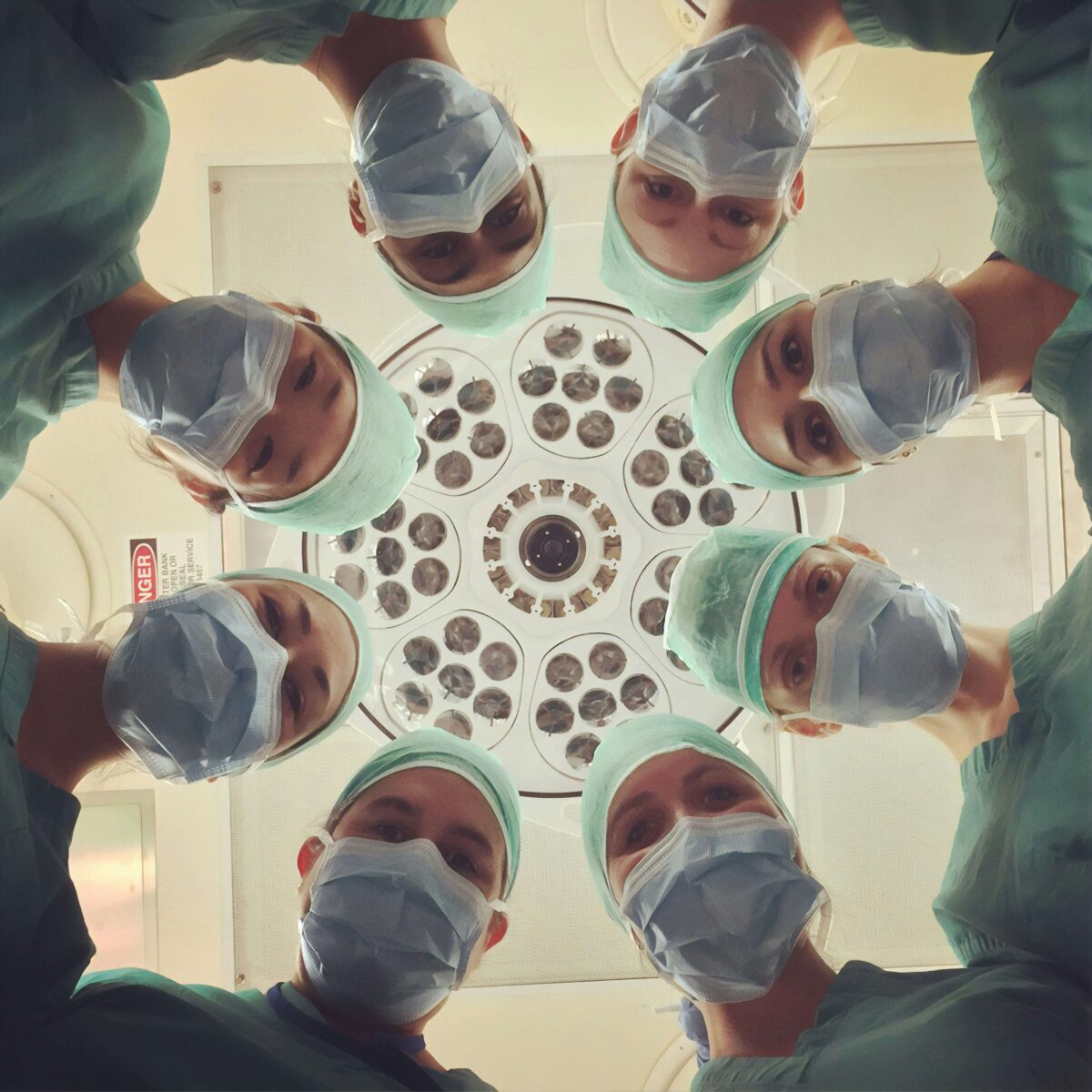Technology is changing how operations are done. IMRA is leading this change by offering a new way to learn surgery online.
You don’t have to be in a traditional classroom anymore. With IMRA, you can learn from experienced surgeons using the internet.
IMRA’s online programs are like an all-access pass to surgical education. Whether you’re already a surgeon wanting to learn new techniques or a student starting out, IMRA’s courses are made for you. Imagine being able to improve your surgical skills from anywhere in the world, at your own pace.
For example, let’s say you’re a doctor in a small town with limited access to specialized training. With IMRA, you can learn advanced techniques without leaving your practice. You could watch videos of surgeries, interact with expert surgeons, and even practice virtual surgeries, all from the comfort of your own home or office.

The future of surgery through education
Surgery is changing fast, and how surgeons learn is changing too. With new online training, surgeons can learn anytime, anywhere. Here’s why it’s important and what it means for the future:
- Easy access: Now, surgeons can learn from their computers or even their phones. No need to travel to a classroom.
- New tools: Learning online doesn’t just mean watching videos. Surgeons can use virtual reality and simulations to practice surgeries.
- Important skills: It’s not just about knowing how to do surgeries. Surgeons also learn about ethics and how to focus on what’s best for the patient.
- Always learning: In the future, surgeons will need to keep learning new technologies. This means being good with computers is just as important as knowing how to operate.
With these changes, surgery education is becoming more flexible and accessible. It’s not just about teaching procedures, it’s about preparing the next generation of surgeons for a rapidly changing world of healthcare.
The virtual operating room: Where simulation meets mastery
The new online platforms for learning surgery are like a virtual operating room (VOR). It’s a special place where technology meets education. Surgeons can practice and improve their skills in this virtual world, kind of like playing a video game but for surgery.
At the heart of the VOR is its lifelike simulation, which mirrors a real surgical environment. This simulation lets surgeons practice tricky procedures without any risk, helping them get better at their techniques, improve their hand coordination, and understand how to move around in space.
Advanced software drives these simulations, recreating patient bodies and reactions so accurately that it feels like performing a real surgery, but without any actual patients involved.
What makes this virtual space special is not just how real it feels, but also how easy it is to use. It’s like having a training ground that’s open all day, every day.
Surgeons can practice complex surgeries over and over again, getting better without worrying about time or ethical issues like using real patients or cadavers. Plus, they can focus on specific areas they want to improve, making the training personal and effective.
How IMRA’s online surgical training elevates learning
IMRA’s online surgical training is revolutionizing medical education worldwide. By combining cutting-edge technology with a dedication to excellence, IMRA creates an immersive learning experience for surgeons globally.
Here’s how IMRA stands out:
- Proficiency-Based learning: IMRA believes in personalized learning. Surgeons can take their time to master each concept before moving on, ensuring a solid understanding of the material.
- Interactive tools and simulation technology: IMRA’s use of interactive tools and simulation tech creates a dynamic learning environment. Surgeons can practice procedures in a simulated setting, gaining valuable hands-on experience.
- Reflective practice: IMRA provides feedback and assessments to help surgeons reflect on their practice. This allows them to identify areas for improvement and set goals for their training.
- Integration of theory and practice: IMRA doesn’t just focus on surgical techniques. Surgeons also learn about patient care and the broader aspects of the profession, making them well-rounded professionals.
- Flexibility and accessibility: IMRA’s online platform is available 24/7, allowing surgeons to learn at their own pace and convenience. This accessibility breaks down geographical barriers and provides equal opportunities for all.
IMRA’s Step-by-Step curriculum
IMRA’s Step-by-Step curriculum embodies this philosophy, providing surgeons with a clear pathway through which they can develop their skills systematically.
This curriculum ensures that every learning stage builds upon the last, resulting in a comprehensive foundation of surgical knowledge and technique.
The curriculum begins with the fundamentals, grounding surgeons in the principles that form safe and effective practice. As learners progress, they are introduced to more advanced topics and techniques, reflecting the depth required in modern surgical care.
The program is designed to evolve alongside the surgeon’s growing expertise, gradually introducing the complexities and nuances of surgical specialties.
| Curriculum stage | Focus area | Learning outcome |
|---|---|---|
| 1. Fundamentals | Basic principles and practices of surgery | A strong foundational understanding |
| 2. Intermediate | Core surgical procedures and patient care | Enhanced skills and decision-making |
| 3. Advanced | Complex cases and specialized techniques | Mastery of sophisticated surgical interventions |
This step-by-step approach not only ensures a well-rounded education but also brings confidence as surgeons navigate the learning process. The curriculum is not just a collection of lessons but a journey that is individualized and paced to match the unique needs of each surgeon.
Foundational robotics and advanced specializations
Surgery is changing fast, and robotics are becoming more important in the operating room. IMRA knows this and offers training specifically designed for surgeons to learn robotic skills, Read more about robotic surgery here.
Here’s how the training progresses:
Starting with the basics: Surgeons learn the fundamentals of robotic surgery, like how the machines work and how to use them. This foundation is crucial for mastering the precision needed in robotic surgeries.
Moving to specializations: As surgeons progress, they dive into specific areas like cardiothoracic, urology, and gynecology. Each stage builds on the last, ensuring a deep understanding of each specialty.
IMRA offers a variety of modules so surgeons can focus on what interests them most. Through simulations and interactive learning, surgeons don’t just learn procedures, they also develop the skills to adapt in real-world situations.
Example: Imagine a surgeon who wants to specialize in urology and learn robotic techniques for prostate surgeries. With IMRA’s training, they start by understanding how robotic systems work and gradually move on to practicing specific procedures. This comprehensive training prepares them to perform surgeries confidently and effectively.

Surgical skill building online
Traditionally, learning surgical skills required being physically present in operating rooms or classrooms. But now, IMRA’s online training changes this, making it possible and effective to learn surgery online.
IMRA offers online education that helps surgeons practice and improve their skills anytime and from anywhere. This program includes:
| Feature | Benefit |
|---|---|
| Video Tutorials | Visual learning aids to understand complex surgical steps. |
| 3D Models | Interactive manipulation to explore anatomy and surgical sites. |
| Case Studies | Realistic scenarios to apply knowledge in a clinical context. |
These online tools make learning engaging and effective, helping surgeons remember and use their skills better. The program is not just about learning once; it lets surgeons keep improving by revisiting the training materials.
This ongoing access to learning helps surgeons get better over time, with features like:
- Accessibility: Surgeons can learn whenever it suits them, making it easier to fit training into their busy schedules.
- Consistency: Regular practice improves their skills.
- Feedback-oriented: The online platform gives instant feedback, helping surgeons quickly improve.
This way of learning allows surgeons to keep enhancing their skills in line with the latest developments in surgery, making their education continuous and relevant to their work.
Tracking progress
In online surgical training, tracking progress is essential. IMRA uses advanced technology on its learning platform to help surgeons see how they are improving. This system not only tracks progress but also motivates surgeons by showing them their achievements and what they still need to accomplish.
IMRA’s tracking includes clear data about a surgeon’s speed, accuracy, and overall skill. This helps turn the learning process into something concrete and measurable:
| Metric | Functionality | Learning Impact |
|---|---|---|
| Speed | Monitors time taken to perform tasks | Improves time management and operational efficiency |
| Accuracy | Assesses precision of surgical techniques | Enhances quality of procedural execution |
| Proficiency | Evaluates overall skills in various procedures | Guides personalized development plans |
This technology also helps update the training materials based on the surgeons’ needs. If a surgeon struggles with a specific skill, the system notices and suggests extra practice. This makes sure the training keeps up with the surgeon’s needs, helping them strengthen weak areas and build on strengths.
IMRA’s precise tracking also promotes a culture of high standards and accountability among surgeons. They can see detailed data on their performance, set clear goals, and compare their progress with others.
This environment is not only competitive but also supportive, encouraging surgeons to become the best through constant feedback and improvement.
IMRA’s Surgical training tools
The path to becoming a skilled surgeon involves continuous learning and improving. The right tools are crucial in this journey, and this is where Pindari Products stand out. They offer innovative surgical training tools that make learning more dynamic, realistic, and effective.
Pindari Products include anatomically accurate models made from hydrogel and advanced surgical simulators. These tools mimic real human tissues, allowing surgeons to practice surgeries in a way that feels real. This is important for developing both technical skills and the tactile sense needed in surgery.
These tools are also cruelty-free, which means they don’t use live animals or human remains. This makes the training not only effective but also ethical and environmentally friendly.
- Hydrogel Tissue Models: Used for realistic practice in suturing, dissection, and more.
- Surgical Simulators: Provide realistic scenarios that reinforce surgical procedures.
Pindari Products are more than just tools, they are a crucial part of a surgeon’s education, continually improved by new technologies. They provide a learning experience that resembles real surgery, helping today’s surgeons prepare for tomorrow’s challenges.
As part of IMRA’s forward-thinking surgical education, Pindari Products set new standards for training that is both realistic and respectful of ethical standards.
Building a community of surgical experts
Surgery isn’t just about individual skill, it’s also about the collective knowledge of its practitioners. Recognizing this,
IMRA focuses on building a vibrant community where surgeons can share insights, discuss complex cases, and keep up with the latest in surgery. This community offers support, mentorship, and a network that enhances a surgeon’s practice.
As for last year we had the chance to partner up with RCSI (Royal College of Surgeons in Ireland) to deliver online training in robotic surgery. Which has strengthen our community.
By uniting diverse surgeons, this community becomes a place full of varied ideas and innovations, leading to better patient care and surgical improvements. It also establishes open channels for communication and debate, helping the field of surgery evolve both as a science and an art. Here are some of the benefits:
- Shared knowledge: Surgeons pool their expertise to improve surgical techniques.
- Peer support: Offers mentorship and guidance from experienced professionals.
- Innovation: Encourages collaboration to develop new methods and approaches.
- Continuing education: Provides access to the latest learning resources and surgical updates.
Additionally, the community recognizes and celebrates surgeons who make significant contributions, whether through research, presentations, or leading new studies. These achievements inspire and motivate all members.

Why choose IMRA for online surgical training?
Choosing the right place to learn surgery online is very important. IMRA’s online surgical training program is a top choice for many because it offers thorough and effective training.
Firstly, IMRA’s program is based on gaining skills step-by-step. This method helps learners feel confident as they move from basic techniques to more advanced surgeries. Each part of the training is tailored to fit each learner’s speed, which helps them really master the skills.
IMRA also uses the latest technology to teach. This includes virtual reality simulations of operating rooms and high-quality videos that make learning as close to real life as possible. These tools help learners understand surgeries better because they can see and feel what they are learning in action.
Moreover, IMRA creates a supportive community. Surgeons can connect with others around the world, share knowledge, and discuss new ideas. This community helps surgeons learn from each other and grow professionally.
IMRA’s training is also very flexible. Their online courses can be accessed anytime and are adjustable to fit different schedules. This makes it easy for surgeons to learn at their own pace without missing out on opportunities.
See all our courses and programs here!
Choosing IMRA means choosing a program that’s innovative, supportive, and flexible, aimed at improving skills and patient care.



